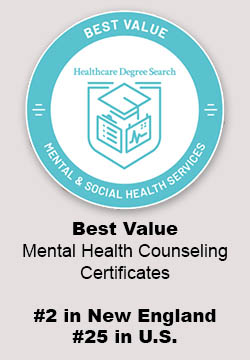Our dedication to Racial Equality and Social Justice (RESJ) spans decades. Learn more about our RESJ Initiative
School Adjustment Counseling for Mental Health Counselors Certificate
-
Credits for Licensure:
15
-
Credits:
15
-
Degree:
post-master's certificate
Program Description

This post-master’s certificate is for licensed mental health counselors who desire the additional credential of licensed school adjustment counselor. The program provides the course work and field experience needed, without repeating course work they will already have taken for mental health.
The School Adjustment and Mental Health Counseling program trains mental health professionals to work within the school culture and in clinical settings serving the mental health needs of PreK-12 students and their families. The use of evidence-based counseling strategies when working with children and adolescents in school settings is emphasized.
In 2021, Cambridge College's mental health counseling certificates were ranked as #1 in New England for Best Quality, #2 in New England for Best Value and #25 in the U.S. for Best Value by Healthcare Degree Search (HDS), an organization that specializes in promoting healthcare careers, and ranks programs on outcome-based factors, based on data from the U.S. Department of Education. Learn more.
Learning Outcomes
Students learn and apply the principles and best practices of counseling, including various psychotherapeutic techniques for work and individuals, couples, families and groups; group counseling; and consultation to organizations and communities. They study human development, dysfunctional behavior and mental illness. They learn to assess, diagnose and treat within the scope of the counselor’s practice, and become able to utilize community resources for referrals. They learn and apply strategies for prevention and treatment of substance abuse, domestic violence, the spectrum of mental illnesses; and learn to use psycho-educational techniques aimed at preventing such disorders. They become familiar with state regulations applicable to mental health practice and licensure.
Careers and Further Study
Students are prepared to meet the licensing standards of the Massachusetts Department of Elementary and Secondary Education. In addition, graduates may apply for the following credential:
- School Social Worker/School Adjustment Counselor (all levels) Program approved by the Mass. Dept. of Elementary & Secondary Education as preparation for initial licensure
Curriculum
Students who previously completed any of the listed courses shall consult with the program chair for substitute course work to meet the requirement of 15 credits.
CCP 698 Pre-Practicum Readiness Seminar for School Adjustment and School Counseling (0-credit) is a 75-hour pre-practicum (prereq. for CCP792A); to be completed in the summer before enrolling in CCP792A.
The Pre-Practicum Readiness Seminar is designed to expose identified school-based students to the various aspects and requirements of a school-based internship. The seminar is designed to outline professional, ethical standards, and appropriate interactions while interning in a school setting. The class will also offer an overview of all school-based graduation paperwork requirements.
Prerequisites: CCP 520.
(enrollment limited to 10.) This course is for students in the School Adjustment/Mental Health program who are in their first semester of an approved ESE/SAC School Internship. This course focuses on students’ mental health counseling practice which is conducted in an approved school setting. A minimum of 225 hours of internship experience are required under the supervision of a qualified supervisor (Massachusetts Regulations 262 CMR) and must also have ESE licensure as a School Adjustment Counselor. Goal(s) for each student will be established with their College internship instructor and site supervisor at the beginning of the experience. Casework, note taking, diagnostic and treatment planning will be analyzed and explored in the classroom with a focus on enhancing students’ clinical skills in these areas. Use of Functional Behavior Assessments will be discussed as well as the formation of groups in the school setting. Additionally, a review of the principles of therapeutic relationships, developing techniques for communicating and working with families, agencies/systems, and school and community personnel; and the use of supervision will be discussed. The diagnosis and treatment of learning and behavioral disorders, when to recommend an educational evaluation, an FBA, an IEP or a 504 will also be discussed. SAC interns will learn to develop plans for the prevention, treatment and referral of students engaged in legal or illegal substances, school violence, school crises and other situations. The progress on the completion of a portfolio demonstrating the student’s advancement through their program of study is required in this course. This course includes the fundamental occupational tasks of assessment, case presentation, case collaboration, team membership and client interaction. Onsite training supervised by a state-approved licensed/certified school adjustment counselor who also has clinical licensure as an LMHC, LICSW, LMFT, licensed psychologist, or psychiatrist is required.
The fieldwork experiences in this course address the following Massachusetts State Standards for School Adjustment Counselors: 3: A practicum of 900 hours, 450 of which must be working with children, adolescents, and families in an educational setting.
Standard a: Principles of therapeutic relationships. C: Learning disorders, including emotional issues affecting student achievement, and their treatment. D: Prevention and treatment of substance abuse, physical and sexual abuse, and violence in PreK-12 students. F: Techniques for communicating and working with families and school personnel.
Take CCP 561 or CCP 715.
Prerequisites: CCP 520 and CCP 792A. (enrollment limited to 10.) This course is for students in the School Adjustment/Mental Health program who are in the second semester of an approved ESE/SAC School Internship. This course focuses on students’ mental health counseling practice which is conducted in an approved school setting. A minimum of 225 hours of internship experience are required under the supervision of a qualified supervisor (Massachusetts Regulations 262 CMR) and must also have ESE licensure as a School Adjustment Counselor. Goal(s) for each student will be established with their College internship instructor and site supervisor at the beginning of the experience. Casework, note taking, diagnostic and treatment planning will be analyzed and explored in the classroom with a focus on enhancing students’ clinical skills in these areas. Development of Behavior Intervention Plans based on Functional Assessments will be discussed as well as establishing groups in the school setting and evaluating their impact. Additionally, a review of the principles of therapeutic relationships, developing techniques for communicating and working with families, agencies/systems, and school and community personnel; and the use of supervision will be discussed. The diagnosis and treatment of learning and behavioral disorders, when to recommend an educational evaluation, an FBA, an IEP or a 504 will also be discussed. SAC interns will learn to develop plans for the prevention, treatment and referral of students engaged in legal or illegal substances, school violence, school crises and other situations. The completion of a portfolio demonstrating the student’s advancement through their program of study is required in this course. This course includes the fundamental occupational tasks of assessment, case presentation, case collaboration, team membership and client interaction. Onsite training supervised by a state-approved licensed/certified school adjustment counselor who also has clinical licensure as an LMHC, LICSW, LMFT, licensed psychologist, or psychiatrist is required.
The fieldwork experiences in this course address the following Massachusetts State Standards for School Adjustment Counselors: 3: A practicum of 900 hours, 450 of which must be working with children, adolescents, and families in an educational setting.
Standard a: Principles of therapeutic relationships. b. Theories of normal and abnormal intellectual, social, and emotional development c: Learning disorders, including emotional issues affecting student achievement, and their treatment. d: Prevention and treatment of substance abuse, physical and sexual abuse, and violence in PreK-12 students. e. Knowledge of state-of-the-art diagnostic instruments; procedures for testing and interpreting results. f Techniques for communicating and working with families and school personnel. g. Knowledge of the criminal justice system with particular reference to the juvenile justice system and organizations. h. Knowledge of medical conditions and medication related to physical disabilities and learning disorders. i. Federal and state laws and regulations addressing the legal rights of students and families
Core Faculty
Senior Instructor
Admissions
-
Admission Test:
No standardized graduate school tests required for admission into non-licensure programs
-
Admissions Office:
1-800-829-4723
- Application Form:
-
Application Fee:
$50 ($100 for international students)
Program Requirements
- Completion of current Cambridge College 60-credit M.Ed. in Mental Health Counseling or equivalent program (bachelor's degree also required).
- Pass Massachusetts Communication & Literacy Test (MTEL) and all other ESE licensure requirements for School Adjustment Counseling.
Health Requirements for Massachusetts Students
The Massachusetts Health Department and Cambridge College require the following of students in Massachusetts:
Immunizations – All students in Massachusetts are required to get certain immunizations before you can register for your first term. See form
Health Insurance – In Massachusetts, undergraduate students taking nine or more credits/term and graduate students taking six or more credits/term must enroll in the College’s health insurance plan. Students who have insurance with comparable coverage may request a waiver. See information and enroll or waive.
School Requirements
International Students
International students need to provide supplemental documentation:
- Official demonstration of English language proficiency
- Supplemental documentation for issuance of I-20
- International transcripts, evaluated by an accepted evaluation service
Transfer Credit
Please complete the transfer credit request form if you wish to have prior course work evaluated for transfer. Learn more about transferring credits.
Tuition
-
Credits for Licensure:
15
-
Credits:
15
-
Application Fee:
$50 ($100 for international students)
-
Health Insurance Fee:
$3,940 - Required for Massachusetts students only. See waiver details on Tuition & Fees page.)
-
Internship/Practicum Fee:
$400
Note: Rates are as of July, 2022, and are subject to change without notice. Rates apply to all students, unless otherwise noted.
Financial Aid
Cambridge College offers financial aid to students in our degree programs who are enrolled at least half time. Undergraduate students must be enrolled in at least 6 credits each term. Graduate and doctoral students must be enrolled in at least 4 credits each term. Learn more
Grants, Scholarships and Loans
Cambridge College welcomes the opportunity to support your efforts to pay for college. Federal, state and local resources in the form of grants, scholarships, loans and work-study, including Cambridge College Scholarships, are available to help defray the cost of tuition. Learn more
Getting Your Company to Help
Many companies have tuition assistance programs, designed to help their employees with their professional development. Learn more


